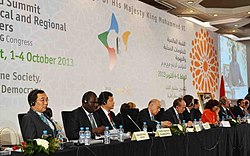| Cités et Gouvernements Locaux Unis (in French) Ciudades y Gobiernos Locales Unidos (in Spanish) | |
 | |
 UCLG Presidium during 2013 World Congress in Morocco, co-chaired by President Kadir Topbaş (Istanbul) & Treasurer Fathallah Oualalou (Rabat). | |
| Abbreviation | UCLG (in English) CGLU (in French) CGLU (in Spanish) |
|---|---|
| Formation | 5 May 2004 [1] |
| Founded at | Paris [1] |
| Merger of | IULA, FMCU, Metropolis |
| Type | International umbrella organization |
| Purpose | Representing and defending the interests of local governments on the world stage [2] |
| Headquarters | Barcelona, Spain |
Region served | Worldwide |
| Methods | Advocacy & dissemination of best practices |
| Fields | Sustainable development goals: |
| Membership | over 240 000 members [3] |
Official language | English, French, Spanish [4] |
Secretary General | Emilia Saiz |
| Uğur İbrahim Altay [5] | |
| Fatimetou Abdel Malick, Johnny Araya, Zhenis Kassymbek, Bheke Stofile, Berry Vrbanovic, Ye Niuping [6] | |
| Ada Colau & Carlos Martínez Mínguez [6] | |
| Oumarou Dogari Moumoun, Ashok Kumar Byanju Shrestha, Aysen Nikolayev, Carola Gunnarsson, Yücel Yilmaz, Fernando Gray, Scott Pearce, Claudia López, Paola Pabón [7] | |
| UCLG Executive Bureau | |
Main organ | UCLG General Assembly |
| Subsidiaries | 9 UCLG Sections [8] & 19 Cross-sectional bodies: [9] |
| Affiliations | Global Taskforce of Local and Regional Governments, [10] United Nations Advisory Committee of Local Authorities & UN ECOSOC's Development Cooperation Forum [11] |
| Website | www |
| Remarks | Partners: Association of Netherlands Municipalities, C40 Cities Climate Leadership Group, Compact of Mayors, European Commission, ICLEI, OECD, UNICEF, United Nations Human Settlements Programme, UN-Water, UN Women, United Nations Office for Disaster Risk Reduction, World Bank, World Water Council |
United Cities and Local Governments (UCLG) is an umbrella international organisation for cities, local and regional governments, and municipal associations. [12]
Contents
- History
- Organization and membership
- Sections
- Governing bodies
- Cross-sectional deliberative bodies
- Events
- Projects
- Global Taskforce of Local and Regional Governments (GTF)
- United Nations Advisory Committee of Local Authorities (UNACLA)
- See also
- References
- External links
The organization achieved inclusion of Goal 11: Sustainable cities and communities into Agenda 2030, [13] [14] aggregates best local practices into action plans, [15] [16] and provides regular updates on the progress and proposals to the High-level Political Forum on Sustainable Development. [17] [18] [19] Its day-to-day activities include hosting meetings of mayors and other local and regional leaders, [20] [21] running joint projects with partners, [22] organizing international peer-to-peer training on local policies and practices, [23] [24] and advocacy for the interests of local and regional governments at the UN. [25] [26] [27]
Since its founding in 2004, [28] [29] UCLG is headquartered in Barcelona (the World Secretariat, Metropolis and UCLG Regions), with its regional offices in Brasília, Brussels, Istanbul, Jakarta, Kazan, La Paz, Ottawa and Rabat. [30] [31] [32] It is the largest organization of sub-national governments in the world, with over 240,000 members in over 140 UN Member States, and understands itself as the united voice and world advocate of democratic local self-government, de facto representing over half the world's population across seven world regions: Africa, Asia-Pacific, Euroasia, Europe, Middle East & West Asia, Latin America and North America. [33] [34]
The organisation's work programme focuses on: [2]
- Increasing the role and influence of local government and its representative organisations in global governance;
- Becoming the main source of support for democratic, effective, innovative local government close to the citizen;
- Ensuring an effective and democratic global organisation









